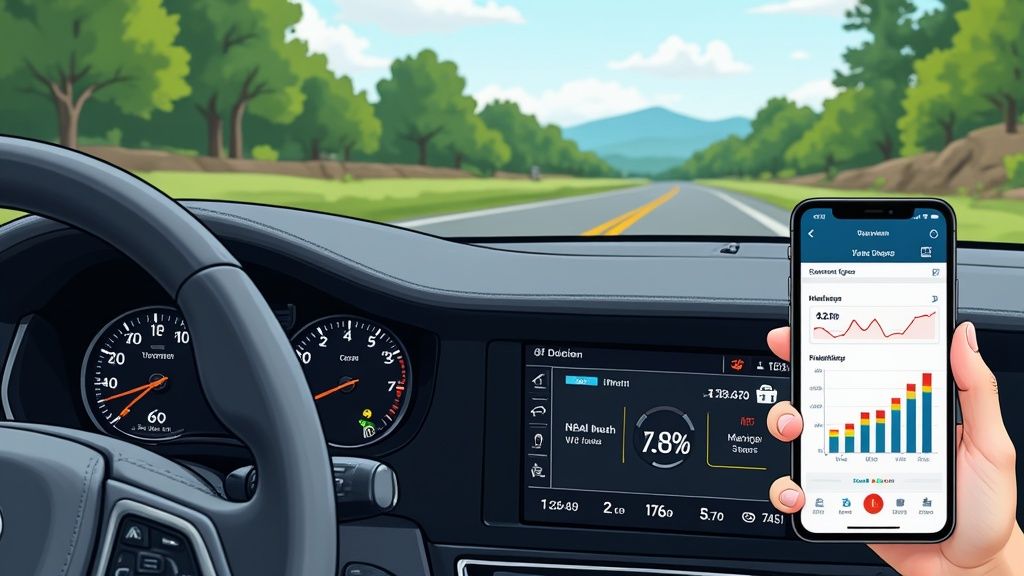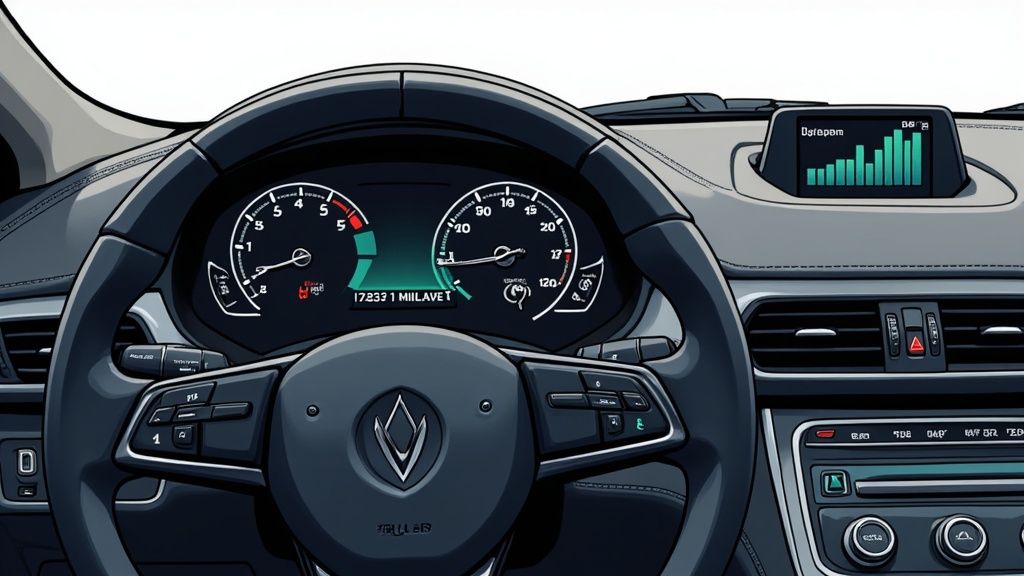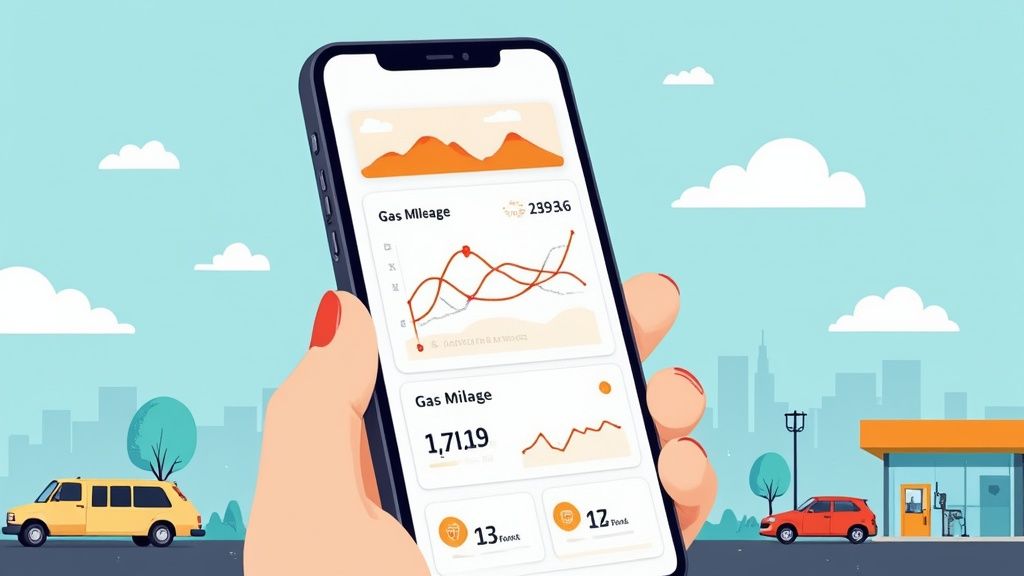
How to Track Gas Mileage: A Complete Guide for Smarter Fuel Management
Getting Started with Gas Mileage Tracking
Understanding your vehicle’s fuel consumption habits is one of the most practical ways to manage transportation costs and vehicle performance. By tracking gas mileage regularly, you can spot potential mechanical issues early and make smarter decisions about your driving habits. This simple practice can lead to meaningful savings while helping you contribute to environmental conservation.

Why Track Gas Mileage?
Regular gas mileage tracking offers several key benefits. Accurate budgeting becomes easier when you understand your typical fuel costs. You can predict expenses for upcoming trips and catch mechanical problems before they become serious repairs. This data also adds value when selling your vehicle, as buyers appreciate detailed maintenance records. Most importantly, being aware of your fuel usage helps you make choices that reduce your environmental impact.
Methods for Tracking Gas Mileage
There are three main approaches to tracking your gas mileage:
-
Traditional Manual Method: Using pen and paper to record odometer readings and fuel purchases at each fill-up. Simple but requires consistent effort.
-
Digital Spreadsheets: Tools like Microsoft Excel or Google Sheets allow for automated calculations and organized record-keeping.
-
Mobile Apps: Dedicated mileage tracking applications offer features like automatic trip recording, business/personal categorization, and tax reporting.
Choosing the Right Method
Your ideal tracking method depends on your specific needs. For occasional drivers with basic tracking needs, manual records work well. If you enjoy data analysis, spreadsheets provide flexibility and control. Business drivers and frequent travelers often benefit most from dedicated tracking apps that automate the process.
The Environmental Protection Agency sets standards for fuel economy measurement in the United States. Their data helps inform government policies and consumer choices about vehicle efficiency. By tracking your own mileage consistently, you can compare your real-world results to official ratings and make informed decisions about your driving habits and vehicle maintenance.
Digital Tools for Better Gas Mileage Tracking

Gone are the days of manual gas mileage calculations. Modern digital tools make monitoring your fuel consumption simple and efficient. These apps and tools automate data tracking and provide clear insights into your driving habits and vehicle performance, helping you save money on fuel costs.
Smart Tracking Apps and Solutions
Many apps offer convenient features for tracking gas mileage based on your needs. The basic functionality lets you log odometer readings and fuel purchases to calculate efficiency. Advanced apps integrate GPS to automatically record trips and minimize manual input. Key features often include:
- Expense tracking and reports
- Maintenance reminders
- Fuel cost analysis
- Multi-vehicle management
Fuel Record is a user-friendly option that helps track fuel economy data through an intuitive interface. The app generates easy-to-read graphs showing your efficiency over time. You can view data by year, quarter, or month and keep notes about maintenance like oil changes and tire rotations.
Working With Vehicle Systems
Many modern vehicles include built-in fuel economy tracking that displays data right on your dashboard. Consider apps that connect with your car’s computer system for seamless monitoring. Some maintenance tracking apps also let you record fuel purchases alongside service history, giving you a complete view of your vehicle’s performance in one place. Learn more at Auto Service Logger.
Finding Your Ideal Tracking Solution
When choosing a gas mileage tracking tool, focus on features that match how you prefer to monitor your vehicle. Key factors to consider:
- Ease of use and interface design
- Automatic vs. manual data entry
- Data visualization options
- Integration with vehicle systems
- Basic vs. advanced analytics
The right tool will make it simple to track your fuel efficiency and make smart decisions about improving your gas mileage over time.
Power of Community Insights

Tracking gas mileage becomes much more useful when you connect with other drivers. By sharing data and experiences within a community, you can gain valuable tips and identify areas where you can improve. Working together multiplies what you can learn on your own.
Getting Better Through Shared Data
Think of gas mileage tracking like training for a marathon - while tracking your own progress matters, comparing notes with other runners helps you understand where you stand and how to improve. Online communities let you compare your fuel economy with drivers of similar vehicles. These comparisons can reveal if your driving habits need adjustment or if your car might have mechanical issues that need attention.
For instance, if you’re getting significantly worse mileage than others with your same car model, it may be time to check tire pressure or schedule maintenance. The community forums also provide a space to ask questions and learn from experienced drivers who have successfully improved their efficiency. This knowledge sharing is especially helpful for new drivers or those getting familiar with a different vehicle.
Real-World Results and Experiences
Online communities offer actual data from real drivers that goes beyond what manufacturers claim. This shows how factors like weather, road conditions, and vehicle modifications impact gas mileage in everyday driving. Fuelly is a great example - it helps users track their mileage over time and see how changes in driving habits affect fuel consumption. Users can compare their data with others, making more informed decisions about their vehicles. By tracking actual gas usage, drivers understand their true fuel costs and can budget accordingly.
Making the Most of Community Knowledge
While community data provides great insights, remember to consider your specific situation. Your driving conditions, maintenance schedule, and local environment all affect your results. Use community information as a helpful guide rather than hard rules to follow.
By contributing your own experiences back to the community, you help build a more complete knowledge base that benefits everyone. Active participation creates ongoing learning opportunities where drivers can share what works and what doesn’t. Sharing both successes and challenges helps others improve their own tracking methods and achieve better fuel efficiency.
Mastering Business Mileage Documentation
Proper mileage tracking can lead to significant tax savings for businesses. Having detailed records not only maximizes deductions but provides essential documentation if your business faces an audit. The key is establishing a reliable system that works for daily use while meeting compliance requirements.
Setting Up an Effective Tracking System
The foundation of good mileage documentation is having a consistent tracking method. Small businesses may find a basic spreadsheet sufficient, while larger operations often need dedicated software. Auto Service Logger provides comprehensive tracking features to record and categorize business miles. GPS tracking integration can automate the process and reduce manual entry errors.
Organizing Records for Tax Time
Good data organization is essential for maximizing tax deductions and meeting IRS requirements. Keep separate logs for each business vehicle and clearly categorize trips by purpose - whether client meetings, deliveries, or supply runs. This detailed organization demonstrates the business purpose of miles driven and simplifies tax preparation.

Meeting IRS Documentation Requirements
The IRS has specific requirements for mileage records. According to IRS Publication 463, you must track:
- Date of each trip
- Destination and business purpose
- Starting and ending odometer readings
- Total miles driven
- Related expenses like gas and tolls
Learn more about proper mileage tracking here. Keep all supporting documents like fuel receipts and maintenance records to verify your mileage claims if needed.
Using Mileage Data for Business Insights
Your mileage records can provide valuable data beyond tax documentation. Regular analysis helps identify:
- Fuel consumption patterns
- Opportunities to optimize routes
- Vehicle and driver performance metrics
- Maintenance timing needs
This information supports smarter decisions about fleet operations and fuel purchasing.
Common Tracking Mistakes to Avoid
Watch out for these frequent mileage tracking errors:
- Delayed or inconsistent recording of trips
- Using different tracking methods across the organization
- Not keeping supporting documentation
- Failing to note business purpose of trips
Using dedicated tracking software like Auto Service Logger helps prevent these issues by providing a standardized system for accurate record-keeping.
Understanding Modern Fuel Economy Standards
Knowing fuel economy standards is essential for measuring your vehicle’s gas mileage accurately. These standards shape how vehicles are designed and built, which affects the fuel efficiency you experience during daily driving.
The Evolution of Fuel Economy Standards
Before 2000, fuel economy requirements stayed mostly unchanged. After Congress ended this period of stagnation, standards began increasing steadily. A major shift came in 2006 with new rules that matched mileage targets to vehicle size. Under these rules, light trucks needed to improve from 22.2 mpg to 24 mpg between 2008-2011 - a 2 percent yearly increase. By 2016, passenger cars had to reach 39 mpg while light trucks needed 30 mpg, with standards rising 5 percent each year. Learn more about this history at Pew Research. These tougher requirements pushed car makers to develop better engines and more efficient vehicle designs.
Impact on Tracking Practices
As fuel economy standards keep changing, drivers need to update how they track their mileage. New vehicle technologies like hybrid systems require different monitoring approaches compared to regular gas engines. Features such as start-stop systems and brake energy recovery affect fuel use in ways that need careful tracking to understand your true efficiency.
Future-Proofing Your Tracking
Modern tracking tools can help you stay current with evolving standards. Digital systems like Auto Service Logger are built to handle new efficiency metrics as they emerge. This ensures your mileage data remains useful for making smart choices about your vehicle’s operation and maintenance.
Adapting to the Future of Fuel Economy
The rise of electric vehicles and new fuel types will change how we measure efficiency. By keeping up with these changes and using flexible tracking methods, you’ll be ready to monitor fuel use effectively no matter what type of vehicle you drive. This forward-looking approach helps you manage fuel costs better over time.
Implementing Professional Tracking Techniques
Gas mileage tracking can provide invaluable insights into your vehicle’s efficiency. As used by fleet managers and efficiency experts, proper tracking helps turn basic fuel monitoring into clear, usable data.
Identifying and Correcting Common Tracking Errors
Accuracy matters when tracking fuel usage. One frequent mistake is inconsistent odometer readings. Make sure to record mileage at the same point every time - either before or after filling up, but not both. Another common error is incorrect fuel amounts. Always verify the gallons entered match your receipt exactly. Even small mistakes like entering 12 gallons instead of 10 can significantly impact your calculated efficiency.
Establishing Reliable Baseline Measurements
Start by establishing a baseline measurement through consistent tracking over several weeks under normal driving conditions. This gives you a reference point for spotting trends and potential issues. For instance, if your mileage suddenly drops compared to baseline, it could indicate developing mechanical problems or changes in driving style.
Implementing Systems for Meaningful Insights
Numbers alone don’t tell the full story. Use spreadsheets or apps that automatically calculate efficiency and generate trend graphs. Visual data helps quickly identify consumption patterns and improvement opportunities. Consider categorizing trips by type (business, personal, commuting) to better understand your fuel usage patterns.
Maintaining Consistency Across Different Vehicles and Driving Conditions
When tracking multiple vehicles or varying routes, keep your methods consistent. Use the same tracking approach for all vehicles and record significant changes in driving conditions. Note factors like towing trailers or mountainous terrain alongside mileage data to account for their effects. This allows fair efficiency comparisons.
Using Tracking Data to Improve Driving Habits and Vehicle Maintenance
Put your tracking data to work by using it to improve efficiency. The numbers reveal how driving style impacts fuel consumption - aggressive acceleration and braking notably reduce mileage. Regular tracking also helps spot maintenance needs early. Gradually declining efficiency might signal issues like dirty air filters or worn spark plugs, letting you address problems proactively.
Ready to simplify your mileage tracking and gain useful insights into your vehicle’s performance? Auto Service Logger offers a complete platform for recording and managing vehicle maintenance, including detailed mileage tracking. Start optimizing your fuel efficiency and protecting your vehicle today. Visit Auto Service Logger to learn more and sign up.